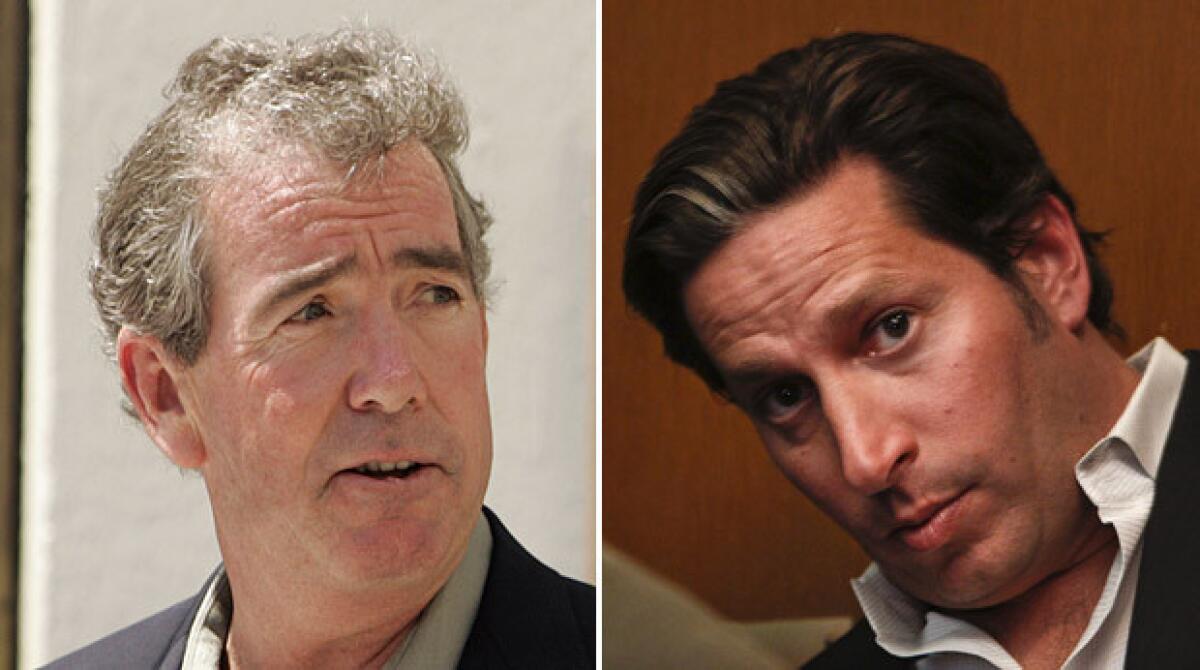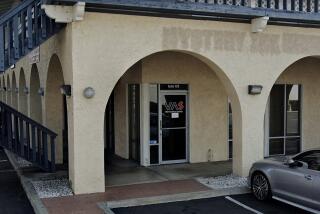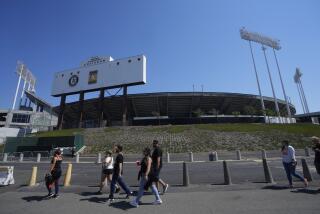Coliseum Commission sues two former top managers

- Share via
The Los Angeles Memorial Coliseum Commission on Thursday sued two former top managers, alleging that they enriched themselves through “corrupt efforts” that siphoned more than $1 million in public money from the stadium.
Also named as defendants are music promoters Insomniac Inc. and Go Ventures Inc., which have staged rave concerts at the Coliseum and companion Sports Arena. The suit accuses the companies, along with former general manager Patrick Lynch and ex-events manager Todd DeStefano, of depriving the commission and its nonprofit concessions arm of concert revenue.
Filed in Los Angeles County Superior Court, the suit seeks to “recover the property and funds that were diverted, stolen or misappropriated” by the defendants, including DeStefano’s wife, Carisse, and three firms the couple controlled.
In addition, it alleges that other unnamed defendants have submitted false claims to illegally obtain funds from the commission, a joint authority of the city, county and state.
The allegations mirror disclosures The Times has made in a series of reports since February.
Attorneys for Lynch and Insomniac denied the accusations.
“We believe their allegations are baseless,” Insomniac lawyer Gary Jay Kaufman said in an email.
Lynch attorney Tony Capozzola said the allegations against his client are “demonstrably false.”
Go Ventures head Reza Gerami said he could not comment because he had not seen the suit. DeStefano’s attorney did not respond to an interview request.
The allegations in the 16-page filing paint a picture of a broad corruption scheme led by Lynch and DeStefano, dating from at least 2006 and continuing until the two resigned early this year.
“For years, Lynch profited personally by abusing his position of trust and responsibility, receiving more than his substantial, lawful wages and benefits from the commission,” the suit says.
It alleges that Lynch, who ran the Coliseum for 17 years, had begun to operate the stadium and Sports Arena as if they were “private businesses he personally owned.”
The suit accuses Lynch of unlawfully receiving at least $394,716 in payments from Tony Estrada, a janitorial contractor at the Coliseum and Sports Arena, money that was deposited in a Miami bank. The payments were the equivalent of about $1 to $1.25 for every hour of labor Estrada billed to the commission, the suit says.
In an Oct. 23 Times report on the payments, Capozzola said they were for a private boat deal between the contractor and Lynch and had nothing to do with the Coliseum.
The suit accuses Todd and Carisse DeStefano of “diverting revenue that could and should have been paid” to the commission by the rave promoters and other companies that did business with the Coliseum, including vendors and film productions.
The Times has reported that firms founded by DeStefano received at least $1.8 million from promoters, vendors, film companies and others he oversaw in his role as Coliseum events manager, according to records and interviews. State corporate records have listed Carisse DeStefano as an officer or manager in her husband’s firms.
Charles Slyngstad, the attorney who filed the suit, said the money allegedly diverted by Lynch, DeStefano and others could far exceed the $1 million figure in the court papers.
He also said the commission is still investigating payments that another former manager, Leopold Caudillo Jr., directed to a firm he founded with a co-worker, David Shea, while both were employed by the Coliseum. Caudillo and Shea went on leave from the Coliseum shortly after The Times reported on their connection to the firm. They no longer work there.
Meanwhile, the suit alleges that Lynch and DeStefano failed to “maximize rent or other revenue” from Insomniac and Go Ventures. “Instead, they used the growing popularity and revenue generation of these events to benefit one or both of themselves,” the suit says.
It alleges that Insomniac and Go Ventures “engaged in unlawful and/or unfair business practices” by underpaying the Coliseum while they were employing the DeStefano firms.
The commission has been struggling financially and lost substantial income after it canceled raves this year, following The Times’ initial reports.
The panel has been unable to pay for Coliseum upgrades promised in a lease with its main tenant, USC football. As a result, the commission is negotiating a new lease that could give USC day-to-day control of the stadium.
More to Read
Sign up for Essential California
The most important California stories and recommendations in your inbox every morning.
You may occasionally receive promotional content from the Los Angeles Times.












